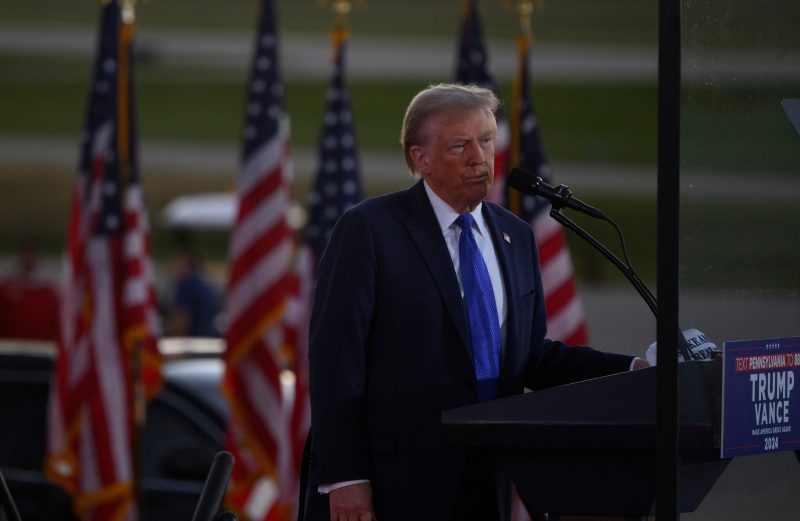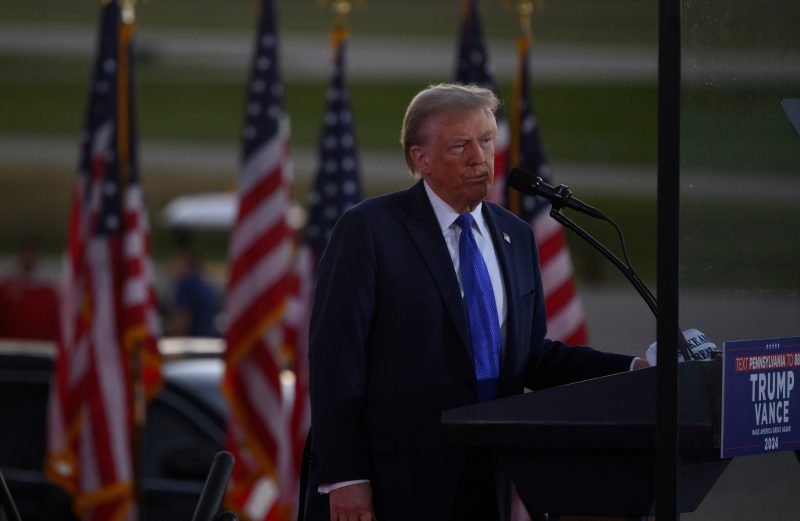
Pro-Trump Georgia election board votes to require hand counts of ballots
ATLANTA — The Georgia State Election Board approved a rule Friday requiring counties in the critical presidential battleground to hand-count all ballots this year, potentially upending the November election by delaying reporting of results by weeks if not months.
The change was spearheaded by a pro-Trump majority that has enacted a series of changes to the state’s election rules in recent weeks and approved the hand-count requirement despite a string of public commenters who begged them not to. Critics included democracy advocates who accused the board of intentionally injecting chaos and uncertainty into the presidential contest, as well as election supervisors and poll workers who said hand counts would take too long, cost money and almost certainly produce counting errors. The office of the Republican state attorney general, which is responsible for advising the board, wrote in an opinion that the change was unlawful.
The board voted 3-2 to approve the measure, which would require the hand count in addition to the customary machine count in each precinct. The rule requires the hand count to take place the night of the November election or the next day. But dozens of election officials said that would be physically impossible in all but the smallest counties. Many also said in public comments Friday that it is far too late in the year to adopt new procedures for which their staffs have not been trained and for which they have no funds.
“Military ballots have already been issued,” said Ethan Compton, elections supervisor in south Georgia’s Irwin County. “The election has begun. This is not the time to change the rules. That will only lower the integrity of our elections.”
The hand-count requirement was one of 11 rules expected to be up for a vote on Friday, the latest batch the State Election Board has considered in recent weeks in an effort, proponents say, to make state elections more secure and transparent. The flurry is the work of a new right-wing majority that took control of the board in May with an avowed mission of preventing fraud and other irregularities from tainting the prsidential result this year.
All three are supporters of former president Donald Trump, and the rules they are pushing have been promoted by the state’s leading proponents of the false claim that Joe Biden stole the Georgia election in 2020.
A handful of speakers defended the new rules, citing irregularities in the 2020 election and claiming that hand-counting would bring needed transparency at a time when trust in the system is low.
“Why aren’t public servants allowing us to see the accountability?” asked Mary Belle Hodges, a resident of Gwinnett County, in suburban Atlanta.
The person who proposed the hand count, Sharlene Alexander of Fayette County, told the board that much of the criticism is based on misinformation because the rule requires the counting of the number of ballots — to make sure the count matches the machine totals — but it does not require hand tabulation of how people voted.
Critics said that’s still an unnecessary burden on election offices. And most speakers warned of the myriad ways they believe a hand count would upend the presidential contest in Georgia — an electoral battleground that Biden won by fewer than 12,000 votes four years ago out of some 5 million cast.
Several pointed to federal court precedent recommending a 90-day “quiet period” ahead of elections during which it is widely considered imprudent to change the rules because of the risk of confusion, error and insufficient training.
Others said hand-counting would cost millions across the state, with the need to hire and train additional workers to conduct the counting, which the rule specifies must be done by three individuals per precinct. Another concern: Requiring poll workers to handle ballots — in some cases multiple times, if the hand counts don’t match the machines and must be started over — injects a security risk into the otherwise strict chain-of-custody rules surrounding ballot handling.
Saira Draper, a Democratic member of the state legislature and election lawyer from DeKalb County, was pointed in her comments at the meeting.
“It makes me question whether members of this board are operating in good faith,” Draper said. “Putting 11, maybe 12 new rules into play days before Election Day is a grift. We are setting up our counties to fail. Why do we know they are going to fail? Because they are telling you that.”
Democrats have already sued over a rule passed earlier this year that could allow counties to delay certification, with a hearing scheduled Oct. 1. More litigation is expected.
Research and practice have shown again and again that hand-counting of ballots is less accurate than machine tallies — and that it can take days, weeks or months, depending on the size of the jurisdiction. A hand-counted audit of 2.1 million ballots in Maricopa County, Ariz., after the 2020 election took more than two months.
Most jurisdictions in the United States already audit election results by hand-counting a sample of ballots and comparing the results to machine tallies. They do so after unofficial results have been reported, encouraging confidence in the result without gumming up counting on election night.
An early version of the hand-counting proposal, which was proposed by one of the majority board members, Janelle King, would have required the count to take place on election night in each precinct.
The board agreed to alter that proposal; the version taken up Friday would allow counties to begin the hand count in their central offices as late as the next day. The rule requires three poll workers to count each precinct’s tallies independently. If their totals don’t match, they must report the discrepancy to the county election board. The hand count would be required to be completed within the week, which experts say is not possible.
Earlier this year, the board passed a rule that critics say could empower county boards to delay certification of results. The rule allows the boards to demand “reasonable inquiries” if they have questions about the outcome of an election. The rule does not specify what a reasonable inquiry is, and it places no limits on the time frame of such a probe or what documents a board can demand.
Georgia law requires county boards to certify their results by the Monday following an election, but critics of the new rule say it could lead boards to misinterpret their power and refuse to certify, thereby slowing the process of state-level certification.
In a presidential election, the calendar for determining which presidential electors will convene and send their votes to Washington is fixed and inflexible, with disruptions having the potential to derail the process. This year, electors are due to convene in every state on Dec. 17, a precursor to the counting of electoral votes in Washington on Jan. 6, 2025.
Some critics say that because the hand-counting requirement would almost certainly inject error into the tabulation process, it could give county boards the evidence they need to investigate results and delay certification. Some questioned whether the two rules together amount to intentional sabotage of state elections.
“Requiring poll workers to hand-count ballots after the close of polls will do nothing more than provide exhausted patriots with an opportunity to undermine public confidence through an honest mistake,” said Joseph Kirk, elections chief in Bartow County, northwest of Atlanta.
The office of state Attorney General Chris Carr (R) also weighed in with a formal analysis of the proposal on Thursday, stating state law does not permit hand-counting ballots at the precinct level.
Board chairman John Fervier, who was appointed by Gov. Brian Kemp (R), voted against the proposal and said he thinks the rule puts the board in legal jeopardy.
“If the legislature had wanted this, they would have put it in statute,” he said. “This board is not here to make law. We’re here to interpret law, and I don’t see anywhere in statute where we’re interpreting the hand counting of ballots after they come out of the machine.”
The State Election Board carries a wide range of responsibilities, including investigating the administration of elections and recommending sanctions or even prosecution for mismanagement or fraud. It also makes recommendations for new laws and writes rules to promote uniformity and integrity in state elections.
It is a bipartisan board, with its five members appointed by the governor, the state House, the state Senate and each of the two major parties. Its role has typically been far less prominent than that of the secretary of state or others involved in administering Georgia’s vote.
The new majority’s partisan tilt has unsettled democracy advocates, county election administrators and the office of Secretary of State Brad Raffensperger (R), which sent a blistering letter to the panel this week denouncing the rules being considered Friday, including one that would require changes to absentee and provisional ballots.
“To underscore the absurdity of the timing of the Board’s actions,” wrote Raffensperger’s general counsel, Charlene McGowan, “[the ballots] have already been printed, and counties will have already begun mailing absentee ballots to voters before any rule change would take effect.”
She added: “It is simply impossible to implement this change for 2024.”
Trump called the three majority members out by name at an Atlanta rally over the summer and referred to them as “pit bulls fighting for honesty, transparency and victory.”
Trump has repeatedly declined to say he will accept the results of the 2024 election and has complained of Democratic “interference,” saying he believes the only way he can lose is if the other side cheats.



